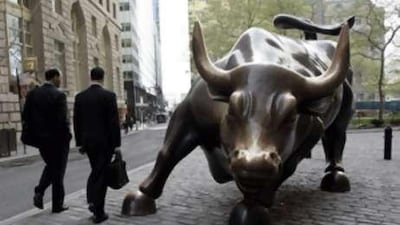The bull run in oil prices of the past six years has been a washout for the world's leading independent energy companies, which have failed to pump up their producing capabilities. Instead of boosting output to take advantage of rising prices, the total amount of oil and natural gas liquids pumped by the six biggest publicly traded oil producers has virtually flatlined since 2002, rising on aggregate by four per cent during the ensuing five years.
The corporate giants are not on life-support because their earnings from oil and gas production have risen in line with prices. However, company profits may plunge when oil prices turn downwards. Combined oil production for the three biggest US oil producers, ExxonMobil, Chevron and ConocoPhillips, and their European counterparts, Royal Dutch Shell, BP and Total, stood at 12.1 million barrels per day (mbd) last year, up just 500,000 bpd from the level in 2002.
The companies' total income from oil and gas production nearly tripled over the five-year period, climbing to US$99.2 billion (Dh364.1bn) from $34.5bn. At the same time, crude prices surged 176 per cent to average $72.20 a barrels in 2007 compared with $26.16 a barrel in 2002. To be sure, oil companies' efforts to raise oil output have met with resistance for a litany of external reasons: ? Decreased access to the world's best oil exploration and development prospects due to environmental activism and a rising tide of resource nationalism;
? Higher oil field and environmental costs; ? Elevated political risk across a spectrum of oil-producing countries; ? Increased tax and regulatory burdens for oil producers in many jurisdictions; and ? Greater technical challenges linked to the need to exploit oil from remote fields and tougher reservoirs. Producers has had no control over these factors, making them justifiable excuses for failing to pump more oil, analysts say.
"They just do not have the access they had years ago, because they cannot get their hands on acreage in nice areas," said Chris Holmes, a senior principal with the energy consulting firm, Purvin and Gertz. "They do not have as big an inventory of projects as perhaps they would like." But if any of these challenges had been insurmountable, then big oil companies would have seen their profits start to flag, even as crude prices rose. So there have also been internal factors keeping oil production low, including the oil price assumptions on which companies have based their decisions on whether to proceed with oil development projects. Usually, such decisions have been based on a much lower threshold oil price than the prevailing market price.
Working to amplify the effect of overly conservative price assumptions on investment decisions, the cost of finding and producing a barrel of oil has risen substantially. Shell, for instance, has disclosed production costs rising 159 per cent to $8.27 a barrel last year from $3.19 a barrel in 2003. BP's costs for finding and developing new oil reserves more than tripled to $13.64 a barrel last year from $3.98 a barrel in 2003, with most of the increase occurring after 2005.
This has led many oil companies to avoid heavy investment in exploration and development programmes. "Some of the rig rates have been going through the roof. Sometimes oil companies have not been able to get hold of rigs, so they have not been able to drill the wells," Mr Holmes said. Indeed, capital spending on oil and gas exploration and production by big energy companies has significantly lagged behind corporate profits and oil prices. From 2002 to 2007 for the six top independent oil producers, it rose 170 per cent, compared to 288 per cent for aggregate upstream income and 276 per cent for prices. Last year, the amount the companies reinvested in oil and gas exploration and production was 87 per cent of their net earnings from those operations. In 2002, reinvestment exceeded profits by 48 per cent.
So instead of applying financial resources to finding and producing more oil, big oil companies have been spending large sums annually on buying back their own shares. The exercise boosts stock prices by cutting the supply of shares, and pacifies at least some shareholders in the short-term. Still, it does nothing to improve corporate productivity, to the detriment of shareholders and oil consumers alike.
The increasing shortfall in capital spending could even be a measure of the disincentive to improve efficiency that high crude prices inevitably exert on oil producers. Mr Holmes does not see much scope for matters to improve. "It is going to be tough. These companies are struggling to develop reserves," he said. @Email:tcarlisle@thenational.ae

